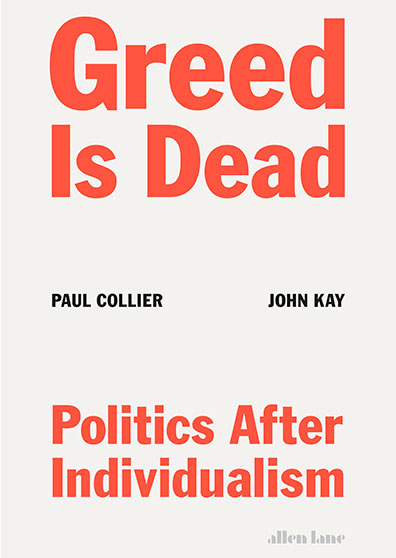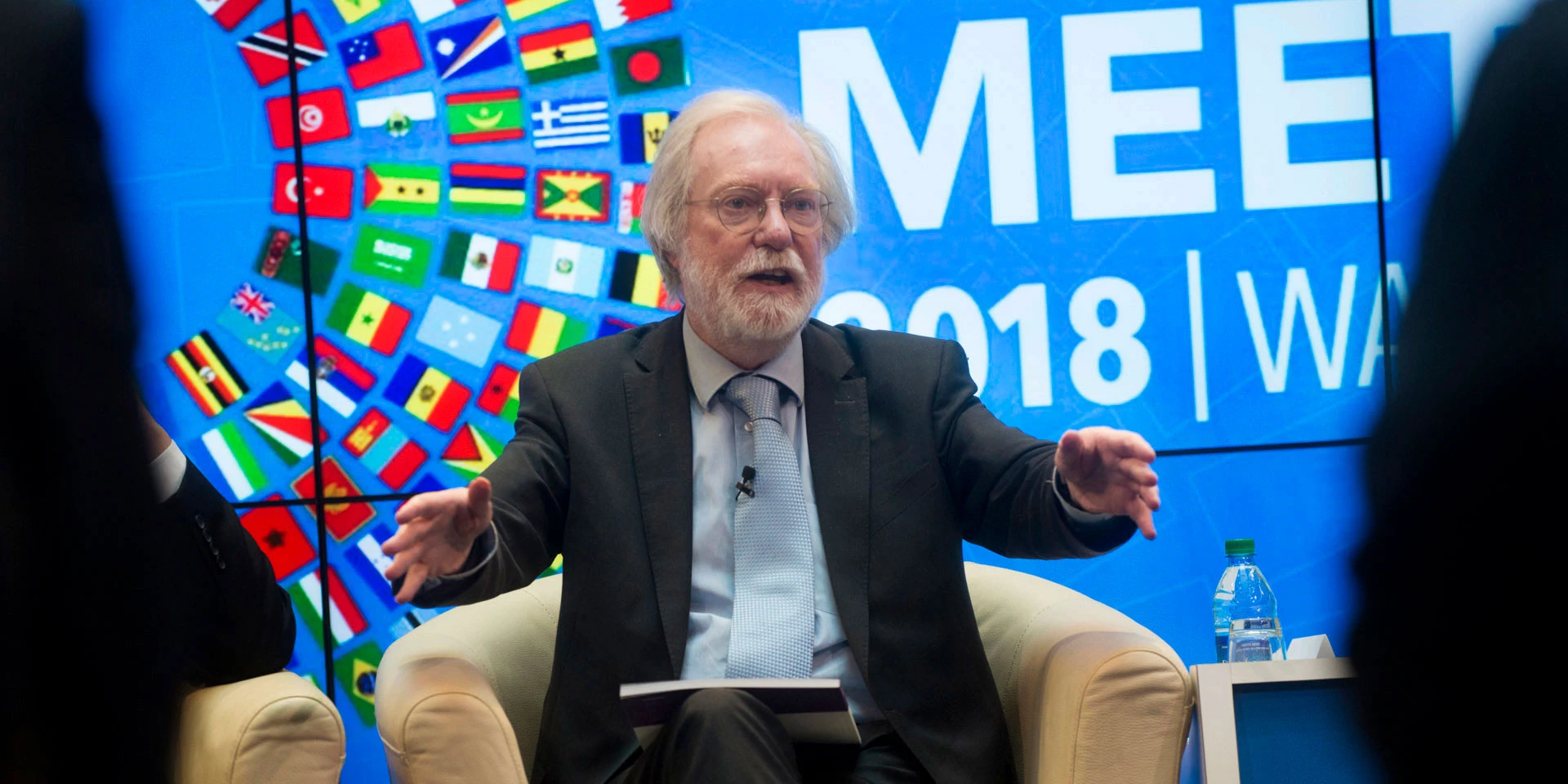By Alison Buckholtz
Development economist Paul Collier, Professor of Economics and Public Policy at Oxford University’s Blavatnik School of Government and former Director of the Research Development Department of the World Bank, is best known for his decades of work examining development in Africa and fragile states. But his most recent book, Greed is Dead: Politics After Individualism, cowritten with John Kay, looks at a problem much closer to home: the corrosive social impact of capitalism in the UK. The book’s thesis—that social cohesion and mutual obligation are vital to any thriving economy—was informed by his ongoing focus on Africa, which he says is now being wrecked by the fallout from the pandemic. He spoke to IFC Insights about what it will take to kill off greed, how to halt the existential threat to Africa’s private sector, and why an agenda for development institutions to work “upstream”—being entrepreneurial and creating conditions in countries that will attract private sector investment—is the right approach at the right time. This interview has been edited for length and clarity.
Q: Your work has principally focused on the developing world, but Greed is Dead is different because you tackle the economic and social ills affecting the UK. What made you want to examine the idea of greed?
 A: Well, the book is not saying that greed is dead. What it's saying is that greed should be dead. And our book is an attempt to kill it intellectually, to kill the ideas that had supported the notion that greed is good. Greed, the book, is the fusion of two ideas. One is the idea that we live in an environment of radical uncertainty. This is very well exemplified by coronavirus, where nobody knows what to do. The other theme is the importance of working together, of social cohesion, and of having a sense of mutuality—a network of obligations to each other.
A: Well, the book is not saying that greed is dead. What it's saying is that greed should be dead. And our book is an attempt to kill it intellectually, to kill the ideas that had supported the notion that greed is good. Greed, the book, is the fusion of two ideas. One is the idea that we live in an environment of radical uncertainty. This is very well exemplified by coronavirus, where nobody knows what to do. The other theme is the importance of working together, of social cohesion, and of having a sense of mutuality—a network of obligations to each other.
Q: You wrote about the necessity for social cohesion just before COVID-19 hit and so this idea was tested, immediately, in the real world. What did the pandemic teach you about how likely people are to depend on networks of mutual obligation in times of crisis?
A: Yes, it was an extraordinary experience to realize that we were living through an event that exemplified what we were writing about. Nobody knew what to do about COVID. But the right response to COVID was to pull together, care about each other. We see very different responses in different societies. At its best, we see people sufficiently caring about each other. And at its worst, we see people viewing their neighbors as their enemies.
Q: Are there plagues in ancient history or even recent history that can guide our thinking on COVID-19’s impact on government and the economy?
A: Well, we open the book with a quote from Pericles, who died in the plague of 430 BC. And what happened [after that plague], unfortunately, was that [Athens] fell apart: social cohesion collapsed, and that's why it was then defeated by Sparta.
Today, we see COVID playing out in different parts of the world according to different cultural narratives. So in East Asia, people said, “Oh, this is another example of SARS.” They knew that SARS was dangerous, but that it could be defeated, and they took very effective measures, behaved very socially responsibly. In Europe and North America, the nearest narrative we could remember was Spanish flu. And once you start thinking of it “just flu,” that's disastrous. In Africa, where I do a lot of work, there were two different narratives, both much more responsible than in Europe and North America. In West Africa, they said, “Oh, this is Ebola.” Well, Ebola was deadly, and they'd managed to stop it, and so, they took a responsible view towards coronavirus. And in southern Africa, they said, “This is AIDS.” And the same thing. They knew that it was fatal, but you could contain it according to appropriate social behavior. So we don't need to go back in history, we can actually see these examples playing out before our very eyes in different parts of the world.
Q: Your recent op-ed in the Financial Times builds the case that that the pandemic threatens Africa's economic promise. What are the most urgent things that IFC should be doing in Africa right now?
A: That’s a very important question. So what North America and Europe have done right, is realize that we need to protect the capital, the organizational capital, which is what our firms are. Our firms are not just collections of equipment. They are people organized in vast teams to be productive. And that organization is hugely valuable. Germany basically spent 10 percent of GDP just on protecting its own firms so they don't go bankrupt during the shock. America spent a lot the same way, very sensibly. Africa has [far] fewer firms. It's desperately short. Africa needs far more firms than it's got. And yet, African governments have no money to protect their firms. So, the firms in Africa are very, very valuable, they're very scarce. And yet, they're under existential threat. They could all go bankrupt in the next few months if nothing is done.
What does IFC need to do? It needs first and foremost, to keep afloat the firms that it's dealing with and then encourage the other 40 DFIs to do the same, and they need to coordinate so that they don't duplicate. They must work in a common fashion to try and keep that organizational capital alive. That's priority number one.
Priority number two is to build, urgently, mechanisms to keep the firms that are not in touch with DFIs afloat. And that can be done by decentralizing venture capital, risk bearing capital. What I want to see is little groups of DFIs, led by IFC, working together to set up local enterprises that can disburse venture capital to locally based firms. So those are to my mind the two real priorities for IFC.
Q: What’s the time frame for this?
A: It’s all urgent. The firms in Africa, just like firms in North America and Europe, are hemorrhaging money now. One way to start is to gather regular, standardized information from across the DFI community—just get the information flowing in, week by week—so that we learn what the situation is, which type of firm is most threatened. Not every firm should be kept alive. Just as in North America and Europe, some firms will and should go to the wall because the world's changed. But the presumption has to be that most of Africa's firms, because it's so short on firms, most need to be kept going.
Q: Is IFC’s Upstream agenda the kind of approach that you are referring to? Is this the right model for private sector development in the years ahead?
A: Yes, first of all, I want to say Philippe [Le Houerou] has been a brilliant [leader]. We got the right person in the right job at the right time for once. And of course, the Upstream agenda is the right way to go. Because remember, I started by saying, Africa doesn't have enough firms, it's desperately short. Two-thirds of Africa's human capital is working solo, or in micro enterprises—no scale, no specialization. That human capital is unproductive unless it can collaborate in large organizations that work productively together. That's what proper firms are. We can't rely on firms blundering into Africa, they need to be stimulated, ignited to get there. And that's the Upstream agenda.
Q: Progress can be slow in development. How do you protect against becoming cynical?
A: I've never been cynical. Cynicism is for people who've lost their souls. I was grounded, because, thank goodness, I had a very decent upbringing from two parents who were uneducated. They both left school when they were 12 but they were enormously decent people [who] brought me up with a sense of duty to others. And I realize how fantastically lucky I've been. There I was at Oxford, the state school kid from Sheffield—sort of the one snowball who survived in hell.
So I've always felt the least I could do was try to use my skills to some sort of purpose larger than just make money for myself. I ask, "What can somebody like me do to help?" And I'm very, very clear that I am not a savior. The poor societies, the fragile societies have some of the strongest, most noble people in the world because they've been forged through fire. People who are decent in shockingly poor societies. They're the people I most respect in life. They're the people who will change their societies, not me. But I do the little I can to help. And that's why I'm not a cynic.
Published in September 2020
